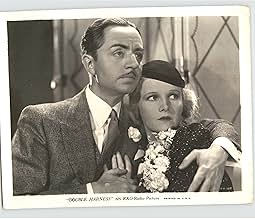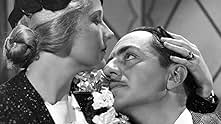IMDb RATING
6.8/10
1.4K
YOUR RATING
A woman tricks a playboy into marrying her and then tries to make him legitimately fall in love with her.A woman tricks a playboy into marrying her and then tries to make him legitimately fall in love with her.A woman tricks a playboy into marrying her and then tries to make him legitimately fall in love with her.
- Director
- Writers
- Stars
- Awards
- 3 wins total
Fred Santley
- Bruno
- (as Fredric Santley)
Irving Bacon
- Crab Counterman
- (uncredited)
Lita Chevret
- Brunette Mannequin
- (uncredited)
Wong Chung
- Chinese Cook
- (uncredited)
Jean Malin
- Fritz Schitz
- (uncredited)
- Director
- Writers
- All cast & crew
- Production, box office & more at IMDbPro
6.81.3K
1
2
3
4
5
6
7
8
9
10
Featured reviews
This delightful and oh-so-sophisticated combination comedy/drama was my personal favorite at Cinefest, 2004.
This delightful and oh-so-sophisticated combination comedy/drama was my personal favorite at Cinefest. With clever dialogue, fetching lead actors and delicious directing, I was hooked at the onset. Beautiful Ann Harding is seen cooking and explaining to her engaged sister (Lucile Brown) that to men, business is business but that marriage is the business of women. Harding sets her sights on William Powell, a super smooth playboy who inherited a struggling shipping line. She sets a trap arranging for her sister to send their father (stern Henry Stephenson) to Powell's apartment for the purpose of catching Harding and Powell alone. To save face, Powell agrees to marry Harding, at least for a while. On the honeymoon, Powell suggests a divorce, while Harding coolly recommends they wait six months so as not to seem too obvious. She then starts steering him to leading his company back to profitability by looking at it as a challenge. With his talents now attending to business and not bedroom conquests, Powell starts to enjoy his newfound success and begins to fall in love with his bride. In the meantime Harding's jealous sister, now unhappily married, has been living beyond her means and needs money fast. She blurts out the truth of the marriage trap when Harding refuses to again pay off her debts. Powell leaves, disillusioned. Harding's father has arranged for a huge business deal to be offered to Powell at a formal dinner party at their home that very night. As Powell is boarding a ship to Europe, his frazzled wife is at home greeting guests and trying to maintain composure. One by one, each guest is involved in a personal crisis and is pulled away from the dinner party from hell, presided over by blustery Reginald Owen as the butler. I can't go on with out spoiling the best joke. This forgotten film is four stars all the way. I saw this film in March of 2004 at the CINEFEST film festival in Syracuse, NY. Thank god for film festivals like this one that make rare films like this available and the folks who provide comments to IMDB for others to share. Please support the IMDB and early film festivals!
The story was okay...
"He always has a drink," said my wife. She was speaking, of course, of William Powell's various characters, and I observed that he was always wealthy. Was he typecast? That is a question for seventy-years-ago; today, we just enjoy his work.
And it starred William Powell. (Isn't that enough?) In DOUBLE HARNESS, Powell plays John Fletcher, a playboy millionaire who is targeted for marriage by Joan Colby (Ann Harding). She gets her man, and this turns out to be to his immediate benefit. She gets him interested in running the company he inherited, and with her help, he's quite successful at it. He's a savvy guy, but she's clearly the woman behind the successful man. (Yes, such a thing still exists, some seventy years after.) Joan's sister Valerie (Lucille Browne) is something of a ditz with spending proclivities beyond her means. This leads to a disaster of a sort, but it's nothing Joan cannot handle.
The ending, which I shan't divulge, left me with a few questions, but the answers were not necessary and I was pleased with the film. William Powell fans, you don't want to miss the master at work.
And it starred William Powell. (Isn't that enough?) In DOUBLE HARNESS, Powell plays John Fletcher, a playboy millionaire who is targeted for marriage by Joan Colby (Ann Harding). She gets her man, and this turns out to be to his immediate benefit. She gets him interested in running the company he inherited, and with her help, he's quite successful at it. He's a savvy guy, but she's clearly the woman behind the successful man. (Yes, such a thing still exists, some seventy years after.) Joan's sister Valerie (Lucille Browne) is something of a ditz with spending proclivities beyond her means. This leads to a disaster of a sort, but it's nothing Joan cannot handle.
The ending, which I shan't divulge, left me with a few questions, but the answers were not necessary and I was pleased with the film. William Powell fans, you don't want to miss the master at work.
Ann Harding rocks!
Just saw this on TCM and I have to say I was floored by Harding's performance, who I saw here for the first time. It takes real talent to act in melodramatic scenes and deliver them so naturally that the viewer never questions your authenticity. Harding adds hundreds of little touches - a gesture here, an eye movement there, that make her performance show you what natural acting is all about. In fact, she makes everyone else pale by comparison - Powell is his usual charming self, but next to Harding he comes off as a typical Hollywood performer. And talk about sophistication! Harding has to be the ultimate in "cool". I can only guess the reason she didn't become as big as Hepburn or Davis is that she didn't fight for better films. I'll be sure to look for more of her work soon.
A Hidden Treasure from 1933
"Double Harness" is a wonderful but obscure little RKO treasure from 1933, directed by John Cromwell, a capable craftsman who throughout his career specialized in prestige studio pictures. This is the earliest Cromwell picture I have seen, an adaptation of a rather loquacious play by Edward Poor Montgomery. I wanted to see it because I love Ann Harding and she is always a beautiful sight in almost everything she is in. I was pleased how radiant and divine Ms. Harding turned out to be in "Double Harness" - definitely one of her top five best films.
It's a small picture, with short (67 min) duration. Yes it's gabby, but intelligent & rapturous all the same, and I urge to seek out if you get the chance. William Powell - restrained, suave, and charismatic - is also wonderful as her romantic interest. Their precise charm and camaraderie and some of the ways she snares him into marriage are quite witty and delightful.
It's a small picture, with short (67 min) duration. Yes it's gabby, but intelligent & rapturous all the same, and I urge to seek out if you get the chance. William Powell - restrained, suave, and charismatic - is also wonderful as her romantic interest. Their precise charm and camaraderie and some of the ways she snares him into marriage are quite witty and delightful.
Stars' Charisma & Director's Talents Lead the Way!!
Ann Harding and William Powell are terrific in this strange little gem of a movie which runs the gamut from Pre-Code Drama to Screwball Comedy! (the closing dinner party scene is worth the price of admission). John Cromwell directs with a sure hand, especially in a great tracking shot involving the two sisters.
It's incredible how modern films seem to lack any sense of sophistication and style in comparison with even lesser known films from the 30's like this one.
A pure joy to watch.
It's incredible how modern films seem to lack any sense of sophistication and style in comparison with even lesser known films from the 30's like this one.
A pure joy to watch.
Did you know
- TriviaThis film hadn't been shown for decades and was found in a Merian C. Cooper collection that had been used for television. A 2½-minute sequence that had been cut from the print was located in a French negative discovered in the National Center for Cinematography in France and restored to the print. The brief segment had been cut for television because it indicated that the characters of Joan Colby and John Fletcher were having pre-marital sex.
- GoofsLilian Bond's character "Monica Paige" has name misspelled in newspaper headline and caption "Mrs. Monica Page Returns".
- Quotes
Valerie Colby: But how can you even think of marrying him if you don't love him?
Joan Colby: Love? Marriage has nothing to do with love. Marriage is a business - at least, it's a woman's business. And love is an emotion. A man doesn't let emotion interfere with *his* business, and if more women would learn not to let emotion interfere with *theirs*, fewer of them would end up in the divorce court.
- ConnectionsFeatured in TCM: Twenty Classic Moments (2014)
- SoundtracksBridal Chorus
(uncredited)
from "Lohengrin"
Composed by Richard Wagner
[Played in the opening scene at the dress boutique]
Details
- Release date
- Country of origin
- Official site
- Language
- Also known as
- Супружество
- Filming locations
- Production company
- See more company credits at IMDbPro
Box office
- Budget
- $329,000 (estimated)
- Runtime
- 1h 9m(69 min)
- Color
- Aspect ratio
- 1.37 : 1
Contribute to this page
Suggest an edit or add missing content


































